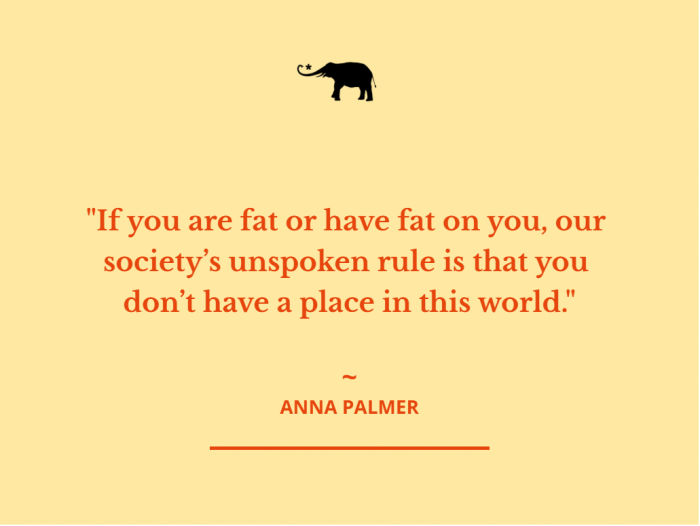~
The following article is an excerpt from Anna Palmer’s book, Coming Home: Healing From an Eating Disorder by Finding Beauty in Imperfection. May the words here grant you deeper permission to come home to the fullness of yourself, humanness, divinity, and all. Welcome home.
~
Bodies, BMIs, and Bullsh*t, Oh My! The Real Toxin: Diets and Fat-phobic Culture
My bulimia began pretty subtly. I don’t remember waking up one day and being a full-blown bulimic. It was more of a gradual slide into the grips of the One-Eyed Monster.
Bulimia takes you by the hand and promises to deliver all you could never give to yourself without it: fleeting pleasure, momentary escape, and sweet oblivion. The desire to escape and numb sneaks up on you late one night when you are alone, promising to give you the comfort and relief you seek. The monster creeps into the nooks and crannies of your house, like a shadow lurking in the background, waiting for any moment of weakness or dropping of your guard. It grips you by the throat, literally and figuratively, overpowering your defenses.
Low self-esteem and a fragile sense of self make a perfect recipe for an eating disorder to ensue or re-ignite. This time, the trigger was more apparent and focused on my body itself. It sent me into the arms of the ED for round two, a much more vicious and long-lasting bout this time.
I remained an athlete, participating in competitive and varsity sports all throughout my high school years. I worked out nearly every day. I went to the gym, but it had normalized and didn’t feel obsessive or weight-focused. It wasn’t connected to the impulse to numb (as it was in the anorexia) or to compensate for binges, as it would be later on.
I felt the healthiest, happiest, and most at peace with myself and with food than I had ever been. Food and my weight were of zero thought or concern. I was a junior in high school. I had a solid group of friends. I was coming out of my shell and being myself again, after many years of self-doubt. I felt like I was becoming me again.
I was weight restored and finally softening and developing more “normal” womanly curves. I never was genetically predisposed to be curvy, but my body began to round out into more womanly traits, gently softening my more toned adolescent frame. To my delight, I even grew a few inches in height!
I started my menstrual cycle, and all seemed to be going well.
My mom, the fitness guru she was and is, had received a few free personal training passes at our gym. She offered them to my sister and me. I was curious to learn new exercises to boost my athletic performance, so I willingly accepted.
At the gym, I saw a trainer whom I’d met in spinning (cycling) classes. She was the epitome of super-fit outwardly, but inwardly may have had her own food and body demons I’d come to find out. At this point in time, I wasn’t really thinking about my body as “too much,” or “too fat.” The only thoughts I had about my body prior to me starting to develop were feeling “unwomanly” or “unfeminine.”
When I started to develop more normally, I was excited and welcoming of these womanly changes. Feeling “abnormal” for so long and mocked by some peers for my smallness, it was a welcomed relief to start blending in more.
Also, despite my feistiness, my smaller frame and size prevented me from standing up against the rest of my competitors on the soccer field. I always was a ferocious competitor and was starting to understand that size did make a difference.
I was ready to be normal again.
The trainer and I scheduled our first training session together. She took me back into her office area where I was weighed and then she measured my Body Mass Index (BMI). Those two numbers, along with my smaller height, were enough to tally up my value, input the data, and spit out what I was worth.
The scale revealed a much higher number than I remembered seeing in my anorexic days. That was a bit of a shock. My brain didn’t comprehend all the other variables, such as muscle composition, recent entry into puberty, and my weight resembling a healthy restored one instead of the weight my anorexic brain had seen back at the doctor’s office many moons ago.
The trainer told me my BMI was above the average range for my height, verging on being in the “overweight” category (which I know now, in retrospect, wasn’t even near an accurate assessment of health as BMIs were not made to take into account muscle mass and are a highly inaccurate measure of health as they were made for men, not women). The BMI has now been shown to be an ill-fitting tool to measure and assess health, according to an article in Business Insider, one of many sources these days about its inaccuracy.
Without this knowledge of inaccuracy by not taking into account muscle mass and being an overall supremely ill-fitting tool for measuring health, the trainer told me my newly discovered fear: I was fat.
My heart began to race as tears welled in my eyes. The message was received and imprinted upon my developing brain and I simply accepted what she said as truth. And that truth was bad, which meant my body itself was “bad.”
“I was fat.”
“I was overweight.”
Translation: something is wrong with my body. Something is wrong with me. That was all I could hear. Heart pounding, nervous system alarm—“I’m not safe”—going off, I needed to get out of my growing discomfort somehow. I needed to change my body and change it fast.
My still-developing brain decided that my normal, healthy, recovering 16-year-old body recently undergoing puberty was “fat,” and being fat was the feared label. Enter our fat-phobic diet culture. Somewhere along the way, we learn that fat and having fat on our bodies is wrong. We learn that if we have fat, we are automatically lazy, disgusting, and shameful humans who are unworthy of love and belonging.
Whether we learn it from our parents, our peers, or from magazines and media, we learn this false belief well. We come to associate and believe that fat, having fat, and being fat means that we are unlovable, lazy, and unwanted members of society. If you are fat or have fat on you, our society’s unspoken rule is that you don’t have a place in this world. Being fat (or having fat) is equated to being unlovable, society says.
These are the lies we learn (and now need to unlearn).
~
Read part one of this series: Coming Home: On Healing from an Eating Disorder.
Read part two of this series: How Eating Disorders are a way of Coping with Emotions & the Effects of Traumatic Events.
Read part three of this series: Hello Bulimia, My Secret Friend: When Food Becomes Survival & the Body the Enemy.
~



 Share on bsky
Share on bsky





Read 0 comments and reply